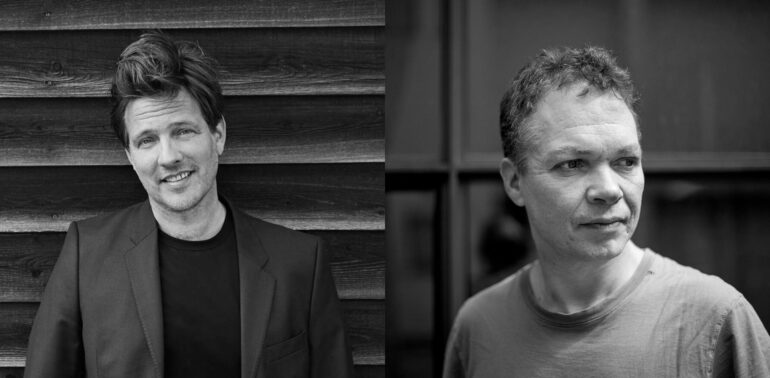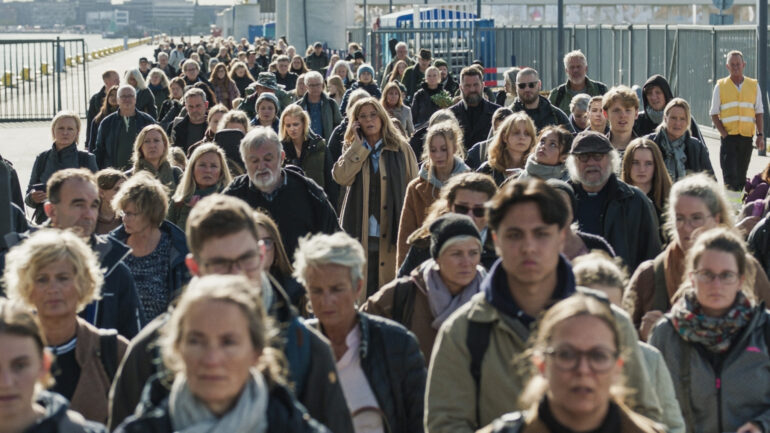WRITTEN BY: Lina Nystrand
The writers on how the story of Families Like Ours began in a Paris hotel room and how they collaborated to craft an emotional, character-driven story rooted in family and the climate crisis.
Danish writers Thomas Vinterberg and Bo Hr. Hansen are nominated for Nordic Series Script Award 2025 for the 7-episode drama series Families Like Ours (Familier som vores).
The series is set in a near-future Denmark, which faces a complete evacuation due to rising water levels, forcing high school student Laura to choose between her family and the boy she loves.
Families Like Ours premiered on TV 2 Denmark 20 October 2024, and is written and directed by Thomas Vinterberg and co-written by Bo Hr. Hansen. The series is produced by Zentropa Entertainments.
The nominees also collaborated around answering the questions below.
What motivated you to write about Danish families as climate refugees?
Thomas: I was in a hotel in Paris having worked there for half a year, missing my family, when I started to think about what would happen if my own family were forced to disperse in different directions by an outside event. If the world were suddenly turned upside down. What would happen to my children if their mother had to go one way, and I another? What would happen if I were to say goodbye to everything I love, and take for granted? Our language, my friends, our songs…our graves?
At the same time, I had also wanted to explore working on a wider scale, and create a tale with gravitas – being able to dive deeper into characters, paint with a bigger brush.
Can you describe the working process (between the two of you) in creating and structuring the series? How do your creative skills feed each other?
The idea came from Thomas, and Thomas has had the final say throughout, but Bo joined very early on, and we have been working closely together in a shared office. Creatively, we have similar/compatible taste. We are both emotionally-driven and have a common language with structure. But still, we are two very different writers regarding different areas of what’s imbedded in this rather extensive script. Broadly speaking, Bo ended up being the main engine of research and what seemed reliable, and Thomas the engine of the emotional drama.
Do you also collaborate in the editing room?
Bo consulted the editing room throughout when asked – and when we had storytelling challenges, such as going from 6 to 7 episodes.
What was your main principle when creating the series’ many main characters?
Many of the characters have a lot on the line. They have much to lose. They are also family-oriented people, who are close to one another, which makes saying farewell and letting go all the more painful.
Thomas generally writes with specific actors in mind, and those actors are also consulted in the process of developing their respective characters.
What was the biggest learnings/surprises from writing the series?
Thomas: I wouldn’t say we were surprised, but the sheer magnitude of the task, the amount of research and languages required, turned out to be monumental.
Initially, we were also faced with comments about credibility regarding the scenario: Would the audience go along with the idea of a country “shutting down”? Or Denmark being flooded? Then reality caught up with us – climate reports from the UN, Covid19 and the war in Ukraine. Now, there is more water in the fields than there is in our series.
How did you manage to avoid a generic catastrophe storytelling?
We insisted on keeping the characters at the forefront. This is a character-driven drama. And rooting the story in scenarios which where – to a certain extent – factually based. Thus, providing the series with a credibility that was anchored in realism. We avoided the catastrophe genre by mostly leaving the water out of frame, but keeping it in our imagination.
Official trailer:

